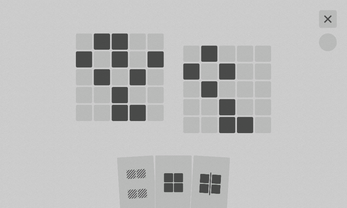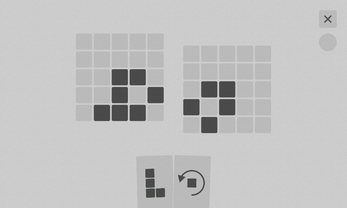Cement
An infinite, random puzzle game about matching patterns.
Repeat the image by applying cards with different effects to your grid, and get new cards until you have all 31. Your progress is saved between sessions. You can open the tutorial from the menu.
Game by Eugene Radaev
Audio by Maxim Panchenko
| Status | Released |
| Platforms | HTML5, Windows, Android |
| Rating | Rated 5.0 out of 5 stars (9 total ratings) |
| Authors | leth, panchenko |
| Genre | Puzzle, Card Game |
| Made with | Unity |
| Tags | 2D, Endless, Minimalist, Mouse only, Singleplayer, Touch-Friendly |
| Average session | A few minutes |
| Inputs | Mouse, Touchscreen |



Comments
Log in with itch.io to leave a comment.
Yeah, these are the kinds of puzzles I like, I love the idea of not necessarily having to use all the cards, and it's satisfying to play. :3 🦊
why its infinite i wish it should have a limit
I liked this =] I wasn't good at it, until I was, and that's when I knew it was working.
Various thoughts copied and rephrased from thinky puzzle discord:
"[regarding the situations where the solution doesn't require using all cards] I love when a puzzle game has
chekov's guns that it never firesred herrings. Or to put it another way, I love when puzzle games are naturalistic, when the fingerprints of a designer are fully absent, our attention is focused entirely on the puzzle itself (though I acknowledge that conveying the thoughts of the designer is a core part of most puzzle games)"I guess it's that... frontier problemsolving irl is mostly about looking for ways of breaking all prior theorists' assumptions, so if games never cultivate a delight for breaking the designer's assumptions and only reward staying inside of the frame, that's trouble.
Thank you! While the extra cards are just a side effect of very straightforward level generation, I had similar things is mind when making it. The game is inspired by the brilliant Mosa Lina, which I love because it's about playing with the system itself and not with a designer. I tried to replicate that in a pure puzzle game.
Ah, mosa lina, yeah, I loved that. It's been argued that it's an immersive sim. If so, for me it's the first immersive sim I liked. What it does so well is it maintains a good balance of difficulty, lets the player fail, and lets them quickly move on from impossible challenges.
If we were to talk about building a BLAME!-inspired immersive sim (also procedural, inevitably), I think finding ways to let the player fail would be a very salient theme.
The challenge of making large procedural worlds in interactive media is that it's sort of impossible to meaningfully interact with something millions of times larger than the player character (or having so much more information than the player could process in 20 hours), but it's not totally impossible, the player gets to make recurring choices as to which direction to trek in, and how to influence the weather movement of the constructors, but if these choices are real, this means the player's failures will be large in scale too, so what happens when a 10 hour journey leads to a dead end, the depletion of supplies, a converging ocean of safeguards? One of the things that makes Blame amenable to adaptation is that despair-inducing run-ending softlocks like these are thematically appropriate. If they couldn't happen, if that despair couldn't really be encountered, it wouldn't be a very good adaptation. Likewise, if the obstacles were not real, then the sense of transcendence in a good ending wouldn't be real either.
Wow, this is very well done. Feels super polished with nice music, satisfying sounds and simple but complex gameplay! Super cool!